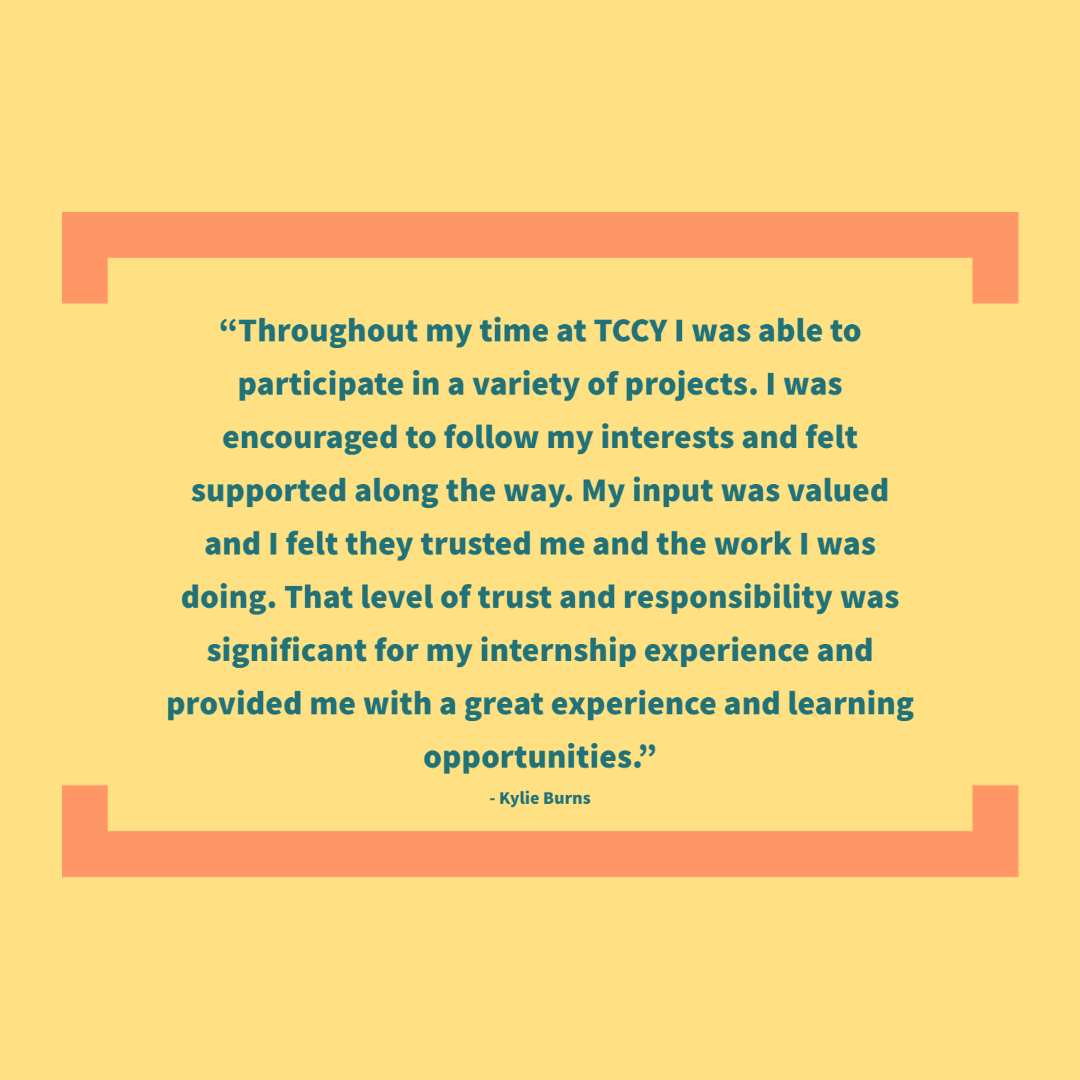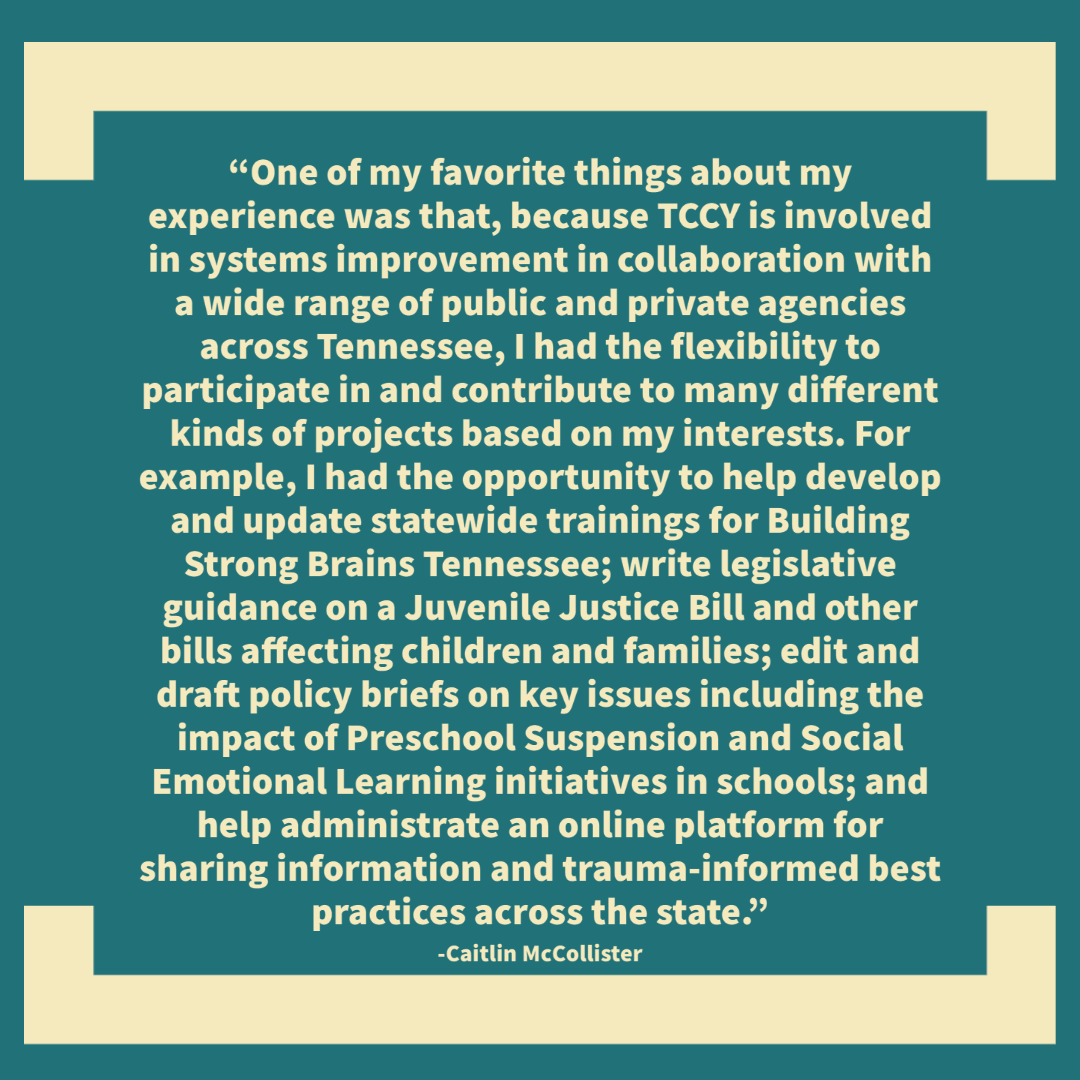Internships
Hear From Previous Interns


Learn About Our Work
TCCY works to ensure equal and fair treatment for all youth within the youth justice system by advocating for and funding evidence-based practices to prevent and reduce youth delinquency.
TCCY youth justice activities include distributing state and federal funds to counties, state-level agencies and community programs to prevent
delinquency or improve services for children involved with juvenile courts. TCCY is the State Advisory Group responsible for implementing the Federal
Juvenile Justice and Delinquency Prevention (JJDP) Act in Tennessee.
Funds administered include the federal JJDP funds and Court Appointed Special Advocate (CASA) grants. CASA program volunteers provide a voice for children in the juvenile court system. Reimbursement accounts help counties without youth detention centers defray the costs of providing alternatives to placing children in adult jails. Programs funded include youth and drug courts, mentoring, after-school programs, training for juvenile court staff and probation programs.
TCCY provides administrative support and technical assistance to the Racial and Ethnic Disparities task forces in Tennessee.
Tennessee has a statewide R/ED Task Force as well as several local R/ED task forces. The task forces consist of concerned citizens and agency
representatives from across the state who meet periodically to address issues regarding the racial and ethnic disparities in the youth justice system.
TCCY provides budget recommendations and legislative guidance, and Ombudsman program, supports the Council on Children’s Mental Health, Second Look Com-mission, Youth Transitions Advisory Council, Home Visiting Leadership Alliance and Young Child Wellness Council, and provides training and advocacy to prevent and mitigate adverse childhood experiences (ACEs).
TCCY has administrative responsibility for the Council on Children’s Mental Health (CCMH) charged with designing a plan for a statewide system of mental health care for children. The Council, composed of a broad range of stakeholders from all across the state, is co-chaired by the commissioner of the Department of Mental Health and Substance Abuse Services (TDMHSAS) and the executive director of TCCY. TCCY also partners with TDMHSAS through System of Care Across Tennessee (SOCAT), a 4-year, $12 million federal grant. SOCAT utilizes System of Care values and principles while empowering Tennessee families to work together with child-serving agencies as a partner to guide their care.
The Home Visiting Leadership Alliance (HVLA) includes leadership from home visiting programs, state departments and other stake holders from across the state. The Tennessee Commission on Children and Youth (TCCY) has administrative responsibility for the HVLA through a grant agreement with the Tennessee Department of Health (TDH). HVLA is co-chaired by TDH and TCCY and meets quarterly.
The Ombudsman responds to questions, concerns or complaints regarding children involved with the state’s child welfare and juvenile justice systems. Referrals are accepted from anyone. A mediation approach is used to resolve disputes in the best interests of the child and the safety of the community.
Administered by TCCY, the Second Look Commission (SLC) was established to review a sampling of cases involving a second or subsequent incident of severe child abuse and provide recommendations and findings to the General Assembly regarding whether or not severe child abuse responses provide adequate protection for the children of this state. The SLC is co-chaired by Senate and House members, and includes representatives from the Department of Children’s Services (DCS), law enforcement, courts, child abuse service providers and the advocacy community.
The Tennessee Young Child Wellness Council (TNYCWC), which seeks to improve the well-being of children in Tennessee by improving collaboration among child-serving agencies and programs . TNYCWC serves as the advisory committee for Tennessee's Maternal, Infant and Early Childhood Home Visiting (MIECHV) program. MIECHV is a grant from the Health Resources & Services Administration within the U.S. Department of Health and Human Services that is received by the Tennessee Department of Health to administer Evidence-Based Home Visiting Programs and support the state’s early childhood system of care.
The Youth Transitions Advisory Council (YTAC) brings together young people and other stakeholders from across Tennessee who work with youth aging out of DCS custody and transitioning from child-serving to adult services systems. YTAC makes recommendations to DCS, courts, schools, higher education and service providers to improve outcomes for successful transition from adolescence to adulthood for young people who often do not have supportive families.
As the Annie E. Casey Foundation’s KIDS COUNT partner in Tennessee, TCCY compiles and provides data to the KIDS COUNT datacenter and produces publications utilizing this and other data to report on the well-being of Tennessee children and families. TCCY administers kidcentraltn.com, a free, one-stop resource for Tennessee families to access state services and find information to help raise healthy and happy kids.
Creating strong brain architecture and healthy child development in the earliest years of life is a critical strategy for preventing disease, disability and social problems across the lifespan. TCCY has intensified its advocacy of and collaboration for early childhood well-being and preventing Adverse Childhood Experiences (ACEs). This work includes training, collaboration and advocacy at local, regional and state levels.
kidcentral tn is a free, one-stop resource for Tennessee families to raise healthy and happy kids. Created by the Governor's Children's Cabinet, kidcentral tn features articles on health, education, development and more. It also includes a searchable directory for state-sponsored services for children and families. The site is maintained by the Tennessee Commission and Children and Youth.
TCCY gathers, analyzes and reports information on children and families in various publications, including the annual KIDS COUNT: The State of the Child in Tennessee, tracking the status of children’s educational, socioeconomic and physical well-being. Tennessee’s KIDS COUNT Project is part of the Annie E. Casey Foundation’s network of state-level KIDS COUNT projects. TCCY participates with the Casey Foundation in the release of reports on child well-being nationally, including the annual National KIDS COUNT Data Book.
TCCY oversees resource mapping of all funding through the state budget to help children in Tennessee be safe, healthy, educated, nurtured and supported and engaged in activities to succeed in school and become productive adults. A report on prior fiscal year spending is submitted to the General Assembly annually. Twenty-five state agencies serving children reported on expenditures during fiscal year 2013-14.
The nine regional councils on children and youth provide training and networking opportunities, create collaborative environments for child-serving organizations, collect and distribute child-focused information and data across the state, and facilitate communication and understanding at the local, regional and state levels.
Questions?
Contact us at tccy.info@tn.gov
